BSC (Hons) Business Law Assignment: UK Law and Employment Law Impact
VerifiedAdded on 2023/06/07
|7
|2678
|343
Homework Assignment
AI Summary
This assignment addresses key aspects of UK business law, covering definitions of law within the UK context, classifications of law (civil and commercial), and the three different legal systems. It explores the hierarchy of legal sources in the English legal system, providing examples. The assignment further examines the impact of UK laws on multilingual organizations and discusses the direct impact of UK law-making processes on commercial organizations, with a focus on employment law. The student provides definitions, characteristics, and examples related to these legal concepts, demonstrating an understanding of the UK legal framework and its practical implications for businesses and individuals, particularly in the context of employment and diversity.
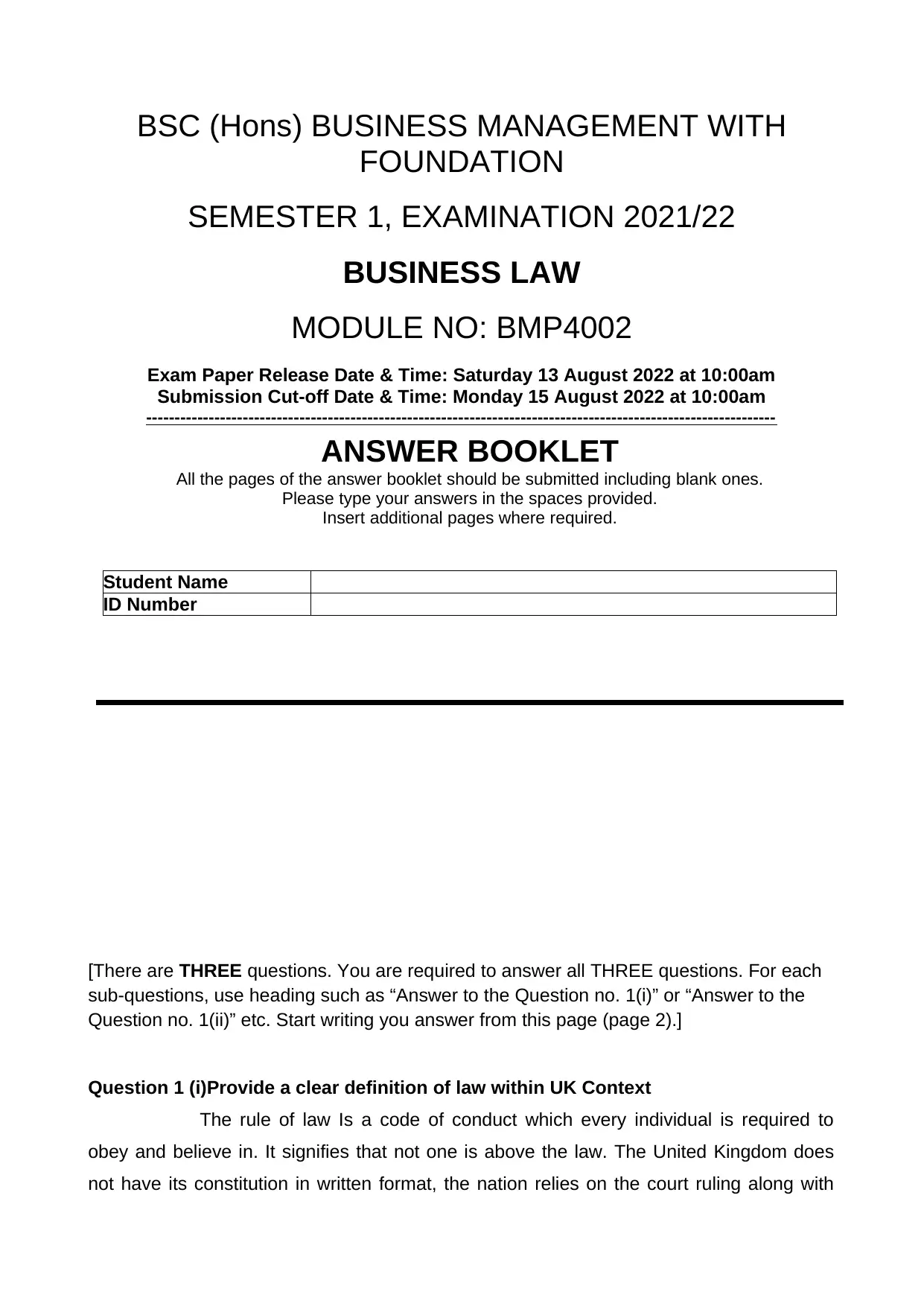
BSC (Hons) BUSINESS MANAGEMENT WITH
FOUNDATION
SEMESTER 1, EXAMINATION 2021/22
BUSINESS LAW
MODULE NO: BMP4002
Exam Paper Release Date & Time: Saturday 13 August 2022 at 10:00am
Submission Cut-off Date & Time: Monday 15 August 2022 at 10:00am
---------------------------------------------------------------------------------------------------------------
ANSWER BOOKLET
All the pages of the answer booklet should be submitted including blank ones.
Please type your answers in the spaces provided.
Insert additional pages where required.
Student Name
ID Number
[There are THREE questions. You are required to answer all THREE questions. For each
sub-questions, use heading such as “Answer to the Question no. 1(i)” or “Answer to the
Question no. 1(ii)” etc. Start writing you answer from this page (page 2).]
Question 1 (i)Provide a clear definition of law within UK Context
The rule of law Is a code of conduct which every individual is required to
obey and believe in. It signifies that not one is above the law. The United Kingdom does
not have its constitution in written format, the nation relies on the court ruling along with
FOUNDATION
SEMESTER 1, EXAMINATION 2021/22
BUSINESS LAW
MODULE NO: BMP4002
Exam Paper Release Date & Time: Saturday 13 August 2022 at 10:00am
Submission Cut-off Date & Time: Monday 15 August 2022 at 10:00am
---------------------------------------------------------------------------------------------------------------
ANSWER BOOKLET
All the pages of the answer booklet should be submitted including blank ones.
Please type your answers in the spaces provided.
Insert additional pages where required.
Student Name
ID Number
[There are THREE questions. You are required to answer all THREE questions. For each
sub-questions, use heading such as “Answer to the Question no. 1(i)” or “Answer to the
Question no. 1(ii)” etc. Start writing you answer from this page (page 2).]
Question 1 (i)Provide a clear definition of law within UK Context
The rule of law Is a code of conduct which every individual is required to
obey and believe in. It signifies that not one is above the law. The United Kingdom does
not have its constitution in written format, the nation relies on the court ruling along with
Paraphrase This Document
Need a fresh take? Get an instant paraphrase of this document with our AI Paraphraser
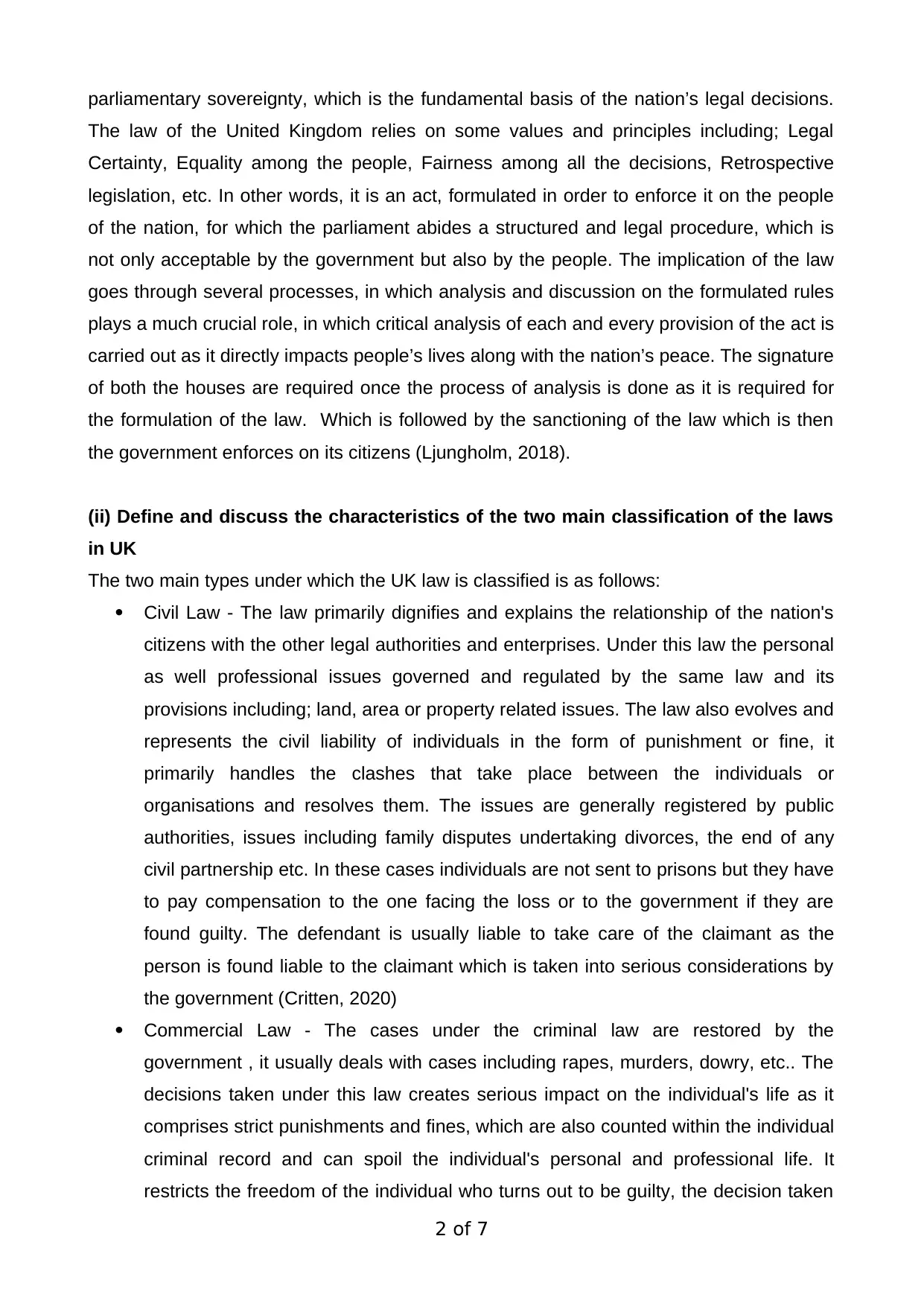
parliamentary sovereignty, which is the fundamental basis of the nation’s legal decisions.
The law of the United Kingdom relies on some values and principles including; Legal
Certainty, Equality among the people, Fairness among all the decisions, Retrospective
legislation, etc. In other words, it is an act, formulated in order to enforce it on the people
of the nation, for which the parliament abides a structured and legal procedure, which is
not only acceptable by the government but also by the people. The implication of the law
goes through several processes, in which analysis and discussion on the formulated rules
plays a much crucial role, in which critical analysis of each and every provision of the act is
carried out as it directly impacts people’s lives along with the nation’s peace. The signature
of both the houses are required once the process of analysis is done as it is required for
the formulation of the law. Which is followed by the sanctioning of the law which is then
the government enforces on its citizens (Ljungholm, 2018).
(ii) Define and discuss the characteristics of the two main classification of the laws
in UK
The two main types under which the UK law is classified is as follows:
Civil Law - The law primarily dignifies and explains the relationship of the nation's
citizens with the other legal authorities and enterprises. Under this law the personal
as well professional issues governed and regulated by the same law and its
provisions including; land, area or property related issues. The law also evolves and
represents the civil liability of individuals in the form of punishment or fine, it
primarily handles the clashes that take place between the individuals or
organisations and resolves them. The issues are generally registered by public
authorities, issues including family disputes undertaking divorces, the end of any
civil partnership etc. In these cases individuals are not sent to prisons but they have
to pay compensation to the one facing the loss or to the government if they are
found guilty. The defendant is usually liable to take care of the claimant as the
person is found liable to the claimant which is taken into serious considerations by
the government (Critten, 2020)
Commercial Law - The cases under the criminal law are restored by the
government , it usually deals with cases including rapes, murders, dowry, etc.. The
decisions taken under this law creates serious impact on the individual's life as it
comprises strict punishments and fines, which are also counted within the individual
criminal record and can spoil the individual's personal and professional life. It
restricts the freedom of the individual who turns out to be guilty, the decision taken
2 of 7
The law of the United Kingdom relies on some values and principles including; Legal
Certainty, Equality among the people, Fairness among all the decisions, Retrospective
legislation, etc. In other words, it is an act, formulated in order to enforce it on the people
of the nation, for which the parliament abides a structured and legal procedure, which is
not only acceptable by the government but also by the people. The implication of the law
goes through several processes, in which analysis and discussion on the formulated rules
plays a much crucial role, in which critical analysis of each and every provision of the act is
carried out as it directly impacts people’s lives along with the nation’s peace. The signature
of both the houses are required once the process of analysis is done as it is required for
the formulation of the law. Which is followed by the sanctioning of the law which is then
the government enforces on its citizens (Ljungholm, 2018).
(ii) Define and discuss the characteristics of the two main classification of the laws
in UK
The two main types under which the UK law is classified is as follows:
Civil Law - The law primarily dignifies and explains the relationship of the nation's
citizens with the other legal authorities and enterprises. Under this law the personal
as well professional issues governed and regulated by the same law and its
provisions including; land, area or property related issues. The law also evolves and
represents the civil liability of individuals in the form of punishment or fine, it
primarily handles the clashes that take place between the individuals or
organisations and resolves them. The issues are generally registered by public
authorities, issues including family disputes undertaking divorces, the end of any
civil partnership etc. In these cases individuals are not sent to prisons but they have
to pay compensation to the one facing the loss or to the government if they are
found guilty. The defendant is usually liable to take care of the claimant as the
person is found liable to the claimant which is taken into serious considerations by
the government (Critten, 2020)
Commercial Law - The cases under the criminal law are restored by the
government , it usually deals with cases including rapes, murders, dowry, etc.. The
decisions taken under this law creates serious impact on the individual's life as it
comprises strict punishments and fines, which are also counted within the individual
criminal record and can spoil the individual's personal and professional life. It
restricts the freedom of the individual who turns out to be guilty, the decision taken
2 of 7
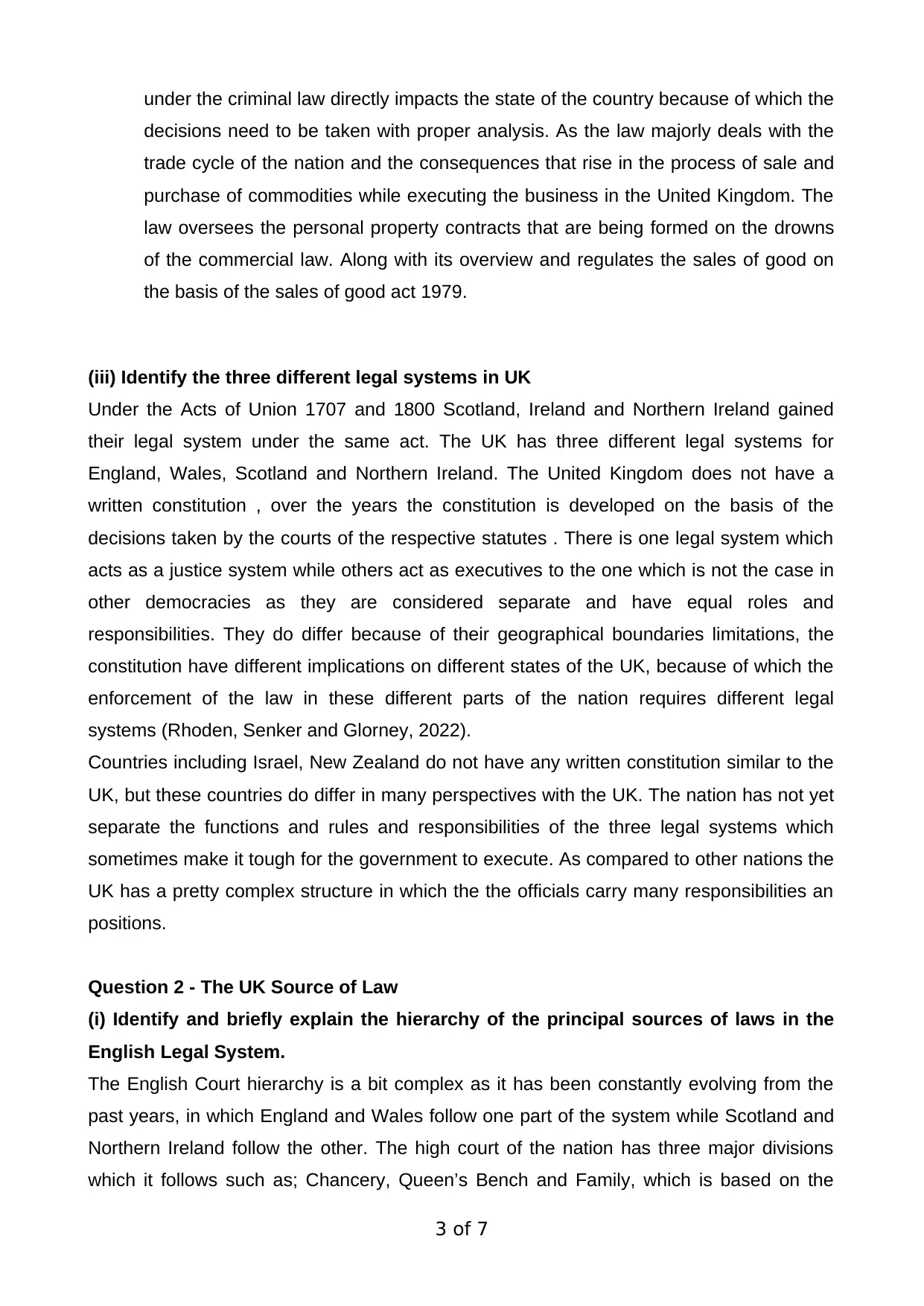
under the criminal law directly impacts the state of the country because of which the
decisions need to be taken with proper analysis. As the law majorly deals with the
trade cycle of the nation and the consequences that rise in the process of sale and
purchase of commodities while executing the business in the United Kingdom. The
law oversees the personal property contracts that are being formed on the drowns
of the commercial law. Along with its overview and regulates the sales of good on
the basis of the sales of good act 1979.
(iii) Identify the three different legal systems in UK
Under the Acts of Union 1707 and 1800 Scotland, Ireland and Northern Ireland gained
their legal system under the same act. The UK has three different legal systems for
England, Wales, Scotland and Northern Ireland. The United Kingdom does not have a
written constitution , over the years the constitution is developed on the basis of the
decisions taken by the courts of the respective statutes . There is one legal system which
acts as a justice system while others act as executives to the one which is not the case in
other democracies as they are considered separate and have equal roles and
responsibilities. They do differ because of their geographical boundaries limitations, the
constitution have different implications on different states of the UK, because of which the
enforcement of the law in these different parts of the nation requires different legal
systems (Rhoden, Senker and Glorney, 2022).
Countries including Israel, New Zealand do not have any written constitution similar to the
UK, but these countries do differ in many perspectives with the UK. The nation has not yet
separate the functions and rules and responsibilities of the three legal systems which
sometimes make it tough for the government to execute. As compared to other nations the
UK has a pretty complex structure in which the the officials carry many responsibilities an
positions.
Question 2 - The UK Source of Law
(i) Identify and briefly explain the hierarchy of the principal sources of laws in the
English Legal System.
The English Court hierarchy is a bit complex as it has been constantly evolving from the
past years, in which England and Wales follow one part of the system while Scotland and
Northern Ireland follow the other. The high court of the nation has three major divisions
which it follows such as; Chancery, Queen’s Bench and Family, which is based on the
3 of 7
decisions need to be taken with proper analysis. As the law majorly deals with the
trade cycle of the nation and the consequences that rise in the process of sale and
purchase of commodities while executing the business in the United Kingdom. The
law oversees the personal property contracts that are being formed on the drowns
of the commercial law. Along with its overview and regulates the sales of good on
the basis of the sales of good act 1979.
(iii) Identify the three different legal systems in UK
Under the Acts of Union 1707 and 1800 Scotland, Ireland and Northern Ireland gained
their legal system under the same act. The UK has three different legal systems for
England, Wales, Scotland and Northern Ireland. The United Kingdom does not have a
written constitution , over the years the constitution is developed on the basis of the
decisions taken by the courts of the respective statutes . There is one legal system which
acts as a justice system while others act as executives to the one which is not the case in
other democracies as they are considered separate and have equal roles and
responsibilities. They do differ because of their geographical boundaries limitations, the
constitution have different implications on different states of the UK, because of which the
enforcement of the law in these different parts of the nation requires different legal
systems (Rhoden, Senker and Glorney, 2022).
Countries including Israel, New Zealand do not have any written constitution similar to the
UK, but these countries do differ in many perspectives with the UK. The nation has not yet
separate the functions and rules and responsibilities of the three legal systems which
sometimes make it tough for the government to execute. As compared to other nations the
UK has a pretty complex structure in which the the officials carry many responsibilities an
positions.
Question 2 - The UK Source of Law
(i) Identify and briefly explain the hierarchy of the principal sources of laws in the
English Legal System.
The English Court hierarchy is a bit complex as it has been constantly evolving from the
past years, in which England and Wales follow one part of the system while Scotland and
Northern Ireland follow the other. The high court of the nation has three major divisions
which it follows such as; Chancery, Queen’s Bench and Family, which is based on the
3 of 7
⊘ This is a preview!⊘
Do you want full access?
Subscribe today to unlock all pages.

Trusted by 1+ million students worldwide
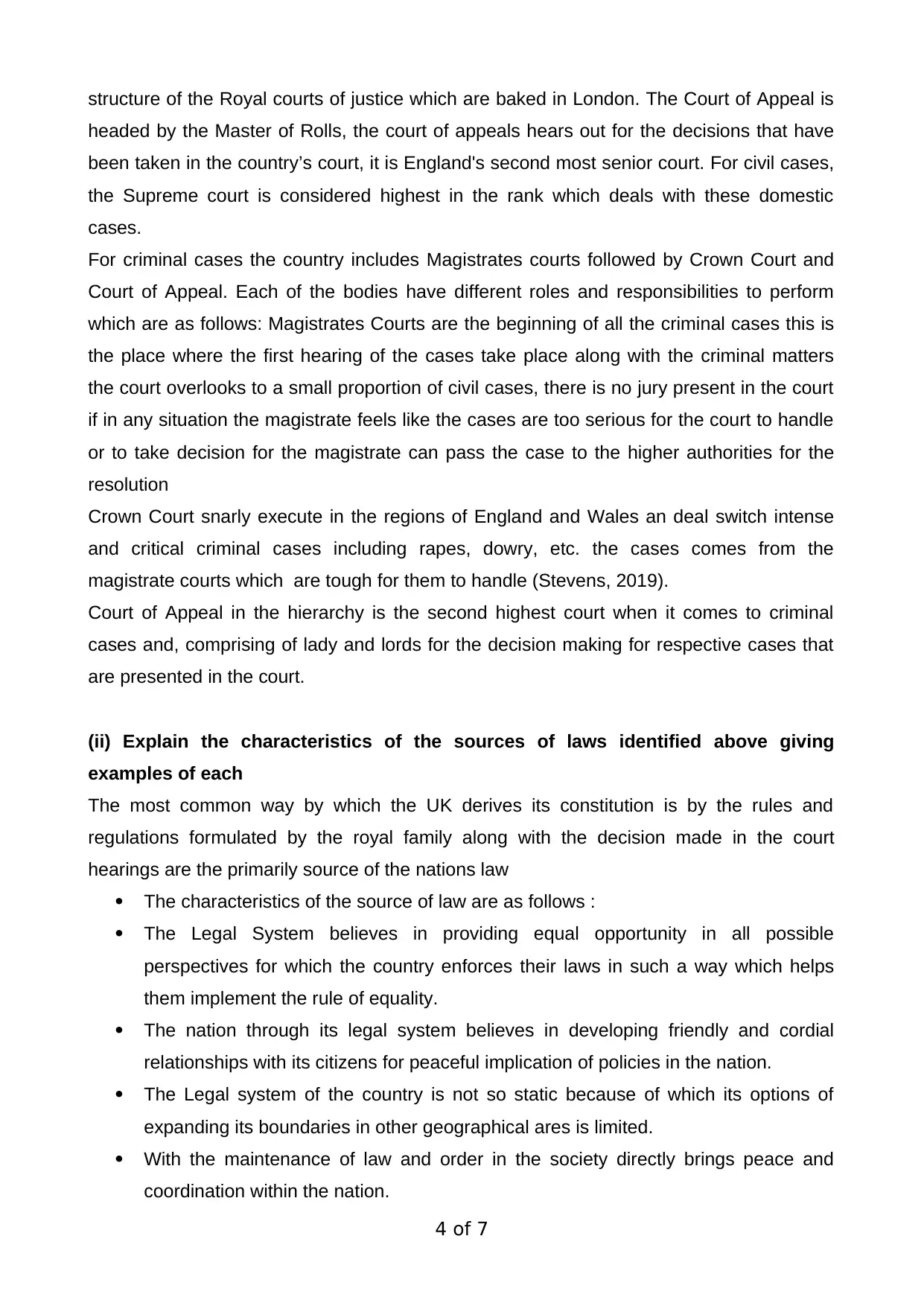
structure of the Royal courts of justice which are baked in London. The Court of Appeal is
headed by the Master of Rolls, the court of appeals hears out for the decisions that have
been taken in the country’s court, it is England's second most senior court. For civil cases,
the Supreme court is considered highest in the rank which deals with these domestic
cases.
For criminal cases the country includes Magistrates courts followed by Crown Court and
Court of Appeal. Each of the bodies have different roles and responsibilities to perform
which are as follows: Magistrates Courts are the beginning of all the criminal cases this is
the place where the first hearing of the cases take place along with the criminal matters
the court overlooks to a small proportion of civil cases, there is no jury present in the court
if in any situation the magistrate feels like the cases are too serious for the court to handle
or to take decision for the magistrate can pass the case to the higher authorities for the
resolution
Crown Court snarly execute in the regions of England and Wales an deal switch intense
and critical criminal cases including rapes, dowry, etc. the cases comes from the
magistrate courts which are tough for them to handle (Stevens, 2019).
Court of Appeal in the hierarchy is the second highest court when it comes to criminal
cases and, comprising of lady and lords for the decision making for respective cases that
are presented in the court.
(ii) Explain the characteristics of the sources of laws identified above giving
examples of each
The most common way by which the UK derives its constitution is by the rules and
regulations formulated by the royal family along with the decision made in the court
hearings are the primarily source of the nations law
The characteristics of the source of law are as follows :
The Legal System believes in providing equal opportunity in all possible
perspectives for which the country enforces their laws in such a way which helps
them implement the rule of equality.
The nation through its legal system believes in developing friendly and cordial
relationships with its citizens for peaceful implication of policies in the nation.
The Legal system of the country is not so static because of which its options of
expanding its boundaries in other geographical ares is limited.
With the maintenance of law and order in the society directly brings peace and
coordination within the nation.
4 of 7
headed by the Master of Rolls, the court of appeals hears out for the decisions that have
been taken in the country’s court, it is England's second most senior court. For civil cases,
the Supreme court is considered highest in the rank which deals with these domestic
cases.
For criminal cases the country includes Magistrates courts followed by Crown Court and
Court of Appeal. Each of the bodies have different roles and responsibilities to perform
which are as follows: Magistrates Courts are the beginning of all the criminal cases this is
the place where the first hearing of the cases take place along with the criminal matters
the court overlooks to a small proportion of civil cases, there is no jury present in the court
if in any situation the magistrate feels like the cases are too serious for the court to handle
or to take decision for the magistrate can pass the case to the higher authorities for the
resolution
Crown Court snarly execute in the regions of England and Wales an deal switch intense
and critical criminal cases including rapes, dowry, etc. the cases comes from the
magistrate courts which are tough for them to handle (Stevens, 2019).
Court of Appeal in the hierarchy is the second highest court when it comes to criminal
cases and, comprising of lady and lords for the decision making for respective cases that
are presented in the court.
(ii) Explain the characteristics of the sources of laws identified above giving
examples of each
The most common way by which the UK derives its constitution is by the rules and
regulations formulated by the royal family along with the decision made in the court
hearings are the primarily source of the nations law
The characteristics of the source of law are as follows :
The Legal System believes in providing equal opportunity in all possible
perspectives for which the country enforces their laws in such a way which helps
them implement the rule of equality.
The nation through its legal system believes in developing friendly and cordial
relationships with its citizens for peaceful implication of policies in the nation.
The Legal system of the country is not so static because of which its options of
expanding its boundaries in other geographical ares is limited.
With the maintenance of law and order in the society directly brings peace and
coordination within the nation.
4 of 7
Paraphrase This Document
Need a fresh take? Get an instant paraphrase of this document with our AI Paraphraser
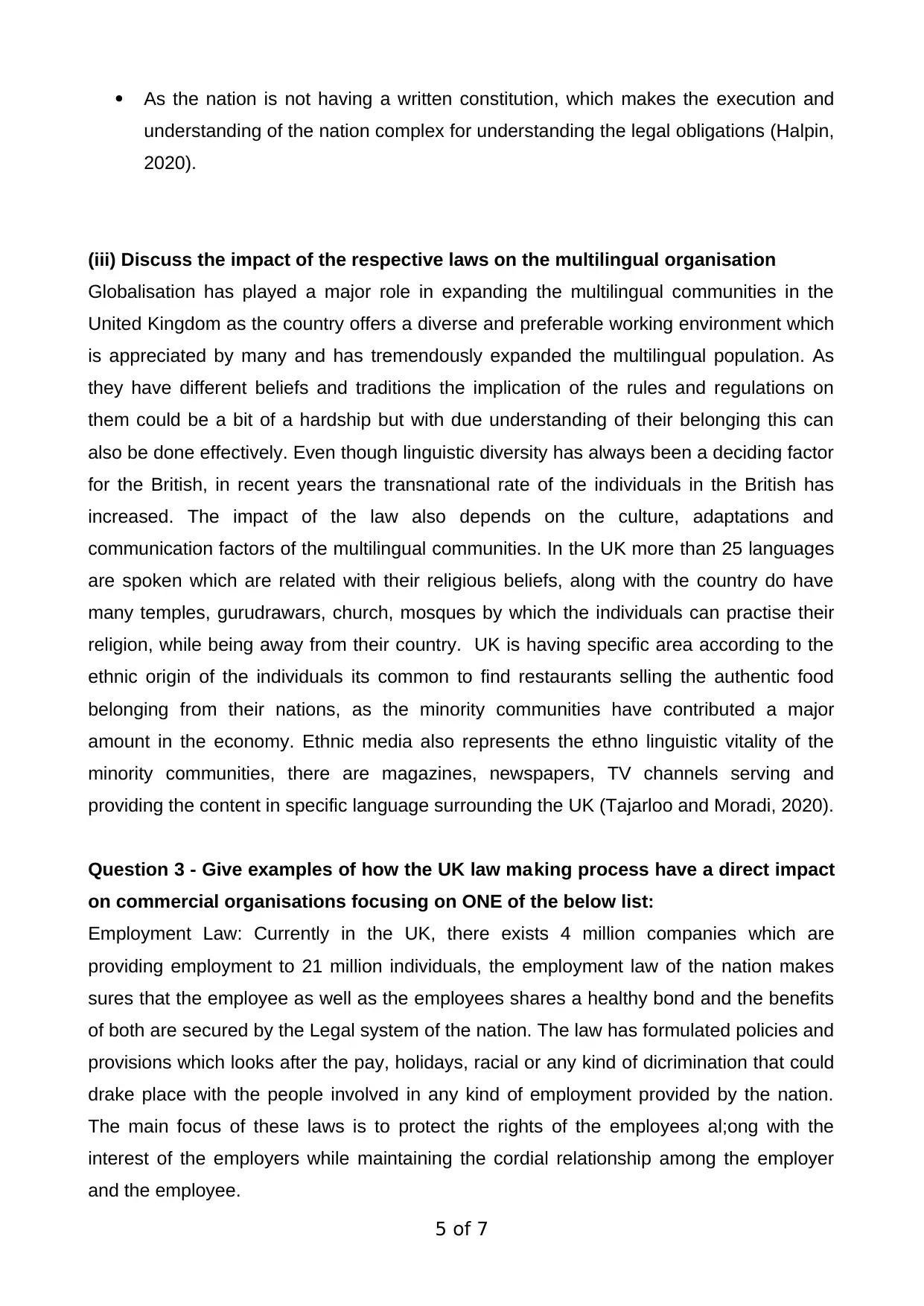
As the nation is not having a written constitution, which makes the execution and
understanding of the nation complex for understanding the legal obligations (Halpin,
2020).
(iii) Discuss the impact of the respective laws on the multilingual organisation
Globalisation has played a major role in expanding the multilingual communities in the
United Kingdom as the country offers a diverse and preferable working environment which
is appreciated by many and has tremendously expanded the multilingual population. As
they have different beliefs and traditions the implication of the rules and regulations on
them could be a bit of a hardship but with due understanding of their belonging this can
also be done effectively. Even though linguistic diversity has always been a deciding factor
for the British, in recent years the transnational rate of the individuals in the British has
increased. The impact of the law also depends on the culture, adaptations and
communication factors of the multilingual communities. In the UK more than 25 languages
are spoken which are related with their religious beliefs, along with the country do have
many temples, gurudrawars, church, mosques by which the individuals can practise their
religion, while being away from their country. UK is having specific area according to the
ethnic origin of the individuals its common to find restaurants selling the authentic food
belonging from their nations, as the minority communities have contributed a major
amount in the economy. Ethnic media also represents the ethno linguistic vitality of the
minority communities, there are magazines, newspapers, TV channels serving and
providing the content in specific language surrounding the UK (Tajarloo and Moradi, 2020).
Question 3 - Give examples of how the UK law making process have a direct impact
on commercial organisations focusing on ONE of the below list:
Employment Law: Currently in the UK, there exists 4 million companies which are
providing employment to 21 million individuals, the employment law of the nation makes
sures that the employee as well as the employees shares a healthy bond and the benefits
of both are secured by the Legal system of the nation. The law has formulated policies and
provisions which looks after the pay, holidays, racial or any kind of dicrimination that could
drake place with the people involved in any kind of employment provided by the nation.
The main focus of these laws is to protect the rights of the employees al;ong with the
interest of the employers while maintaining the cordial relationship among the employer
and the employee.
5 of 7
understanding of the nation complex for understanding the legal obligations (Halpin,
2020).
(iii) Discuss the impact of the respective laws on the multilingual organisation
Globalisation has played a major role in expanding the multilingual communities in the
United Kingdom as the country offers a diverse and preferable working environment which
is appreciated by many and has tremendously expanded the multilingual population. As
they have different beliefs and traditions the implication of the rules and regulations on
them could be a bit of a hardship but with due understanding of their belonging this can
also be done effectively. Even though linguistic diversity has always been a deciding factor
for the British, in recent years the transnational rate of the individuals in the British has
increased. The impact of the law also depends on the culture, adaptations and
communication factors of the multilingual communities. In the UK more than 25 languages
are spoken which are related with their religious beliefs, along with the country do have
many temples, gurudrawars, church, mosques by which the individuals can practise their
religion, while being away from their country. UK is having specific area according to the
ethnic origin of the individuals its common to find restaurants selling the authentic food
belonging from their nations, as the minority communities have contributed a major
amount in the economy. Ethnic media also represents the ethno linguistic vitality of the
minority communities, there are magazines, newspapers, TV channels serving and
providing the content in specific language surrounding the UK (Tajarloo and Moradi, 2020).
Question 3 - Give examples of how the UK law making process have a direct impact
on commercial organisations focusing on ONE of the below list:
Employment Law: Currently in the UK, there exists 4 million companies which are
providing employment to 21 million individuals, the employment law of the nation makes
sures that the employee as well as the employees shares a healthy bond and the benefits
of both are secured by the Legal system of the nation. The law has formulated policies and
provisions which looks after the pay, holidays, racial or any kind of dicrimination that could
drake place with the people involved in any kind of employment provided by the nation.
The main focus of these laws is to protect the rights of the employees al;ong with the
interest of the employers while maintaining the cordial relationship among the employer
and the employee.
5 of 7
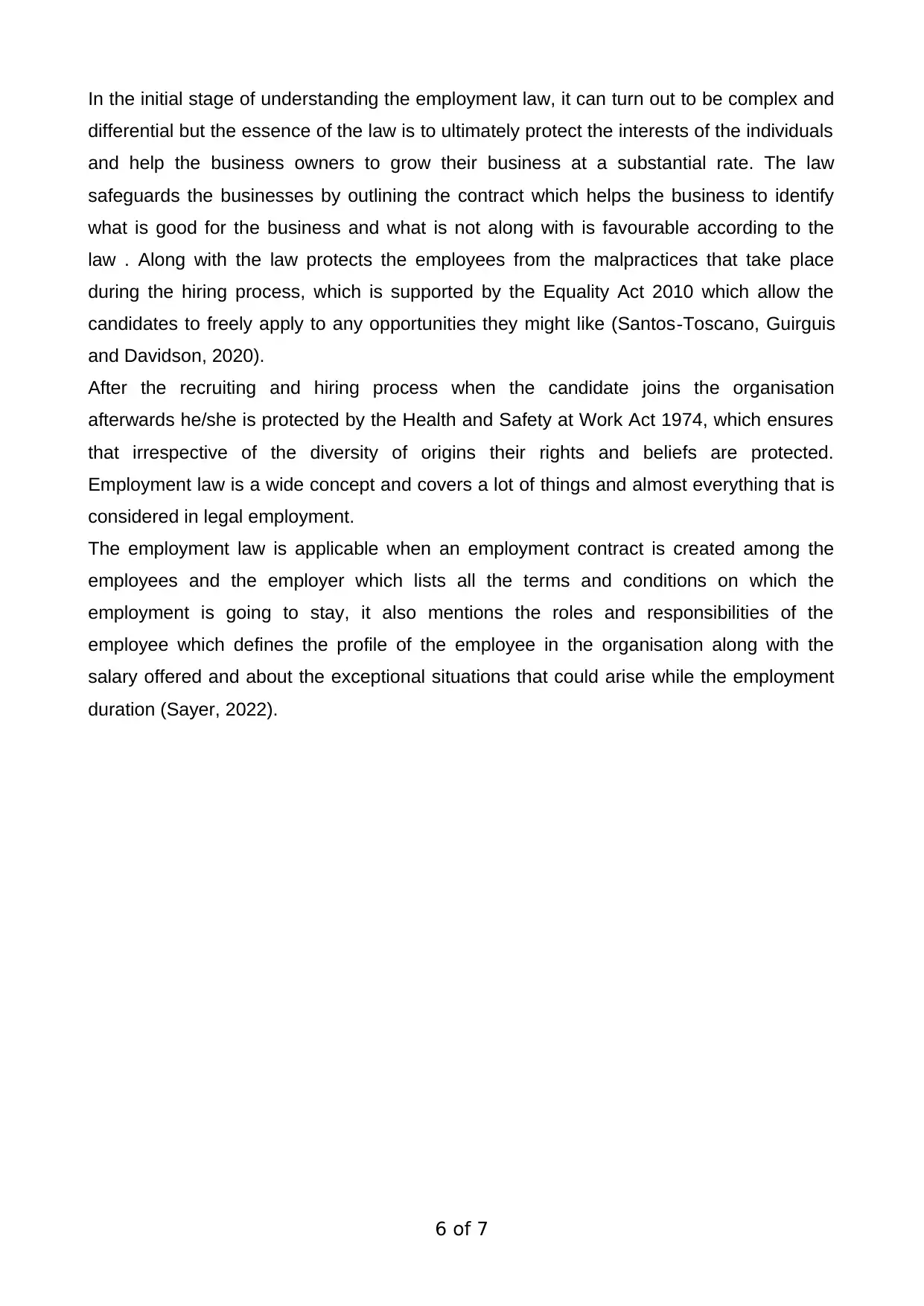
In the initial stage of understanding the employment law, it can turn out to be complex and
differential but the essence of the law is to ultimately protect the interests of the individuals
and help the business owners to grow their business at a substantial rate. The law
safeguards the businesses by outlining the contract which helps the business to identify
what is good for the business and what is not along with is favourable according to the
law . Along with the law protects the employees from the malpractices that take place
during the hiring process, which is supported by the Equality Act 2010 which allow the
candidates to freely apply to any opportunities they might like (Santos‐Toscano, Guirguis
and Davidson, 2020).
After the recruiting and hiring process when the candidate joins the organisation
afterwards he/she is protected by the Health and Safety at Work Act 1974, which ensures
that irrespective of the diversity of origins their rights and beliefs are protected.
Employment law is a wide concept and covers a lot of things and almost everything that is
considered in legal employment.
The employment law is applicable when an employment contract is created among the
employees and the employer which lists all the terms and conditions on which the
employment is going to stay, it also mentions the roles and responsibilities of the
employee which defines the profile of the employee in the organisation along with the
salary offered and about the exceptional situations that could arise while the employment
duration (Sayer, 2022).
6 of 7
differential but the essence of the law is to ultimately protect the interests of the individuals
and help the business owners to grow their business at a substantial rate. The law
safeguards the businesses by outlining the contract which helps the business to identify
what is good for the business and what is not along with is favourable according to the
law . Along with the law protects the employees from the malpractices that take place
during the hiring process, which is supported by the Equality Act 2010 which allow the
candidates to freely apply to any opportunities they might like (Santos‐Toscano, Guirguis
and Davidson, 2020).
After the recruiting and hiring process when the candidate joins the organisation
afterwards he/she is protected by the Health and Safety at Work Act 1974, which ensures
that irrespective of the diversity of origins their rights and beliefs are protected.
Employment law is a wide concept and covers a lot of things and almost everything that is
considered in legal employment.
The employment law is applicable when an employment contract is created among the
employees and the employer which lists all the terms and conditions on which the
employment is going to stay, it also mentions the roles and responsibilities of the
employee which defines the profile of the employee in the organisation along with the
salary offered and about the exceptional situations that could arise while the employment
duration (Sayer, 2022).
6 of 7
⊘ This is a preview!⊘
Do you want full access?
Subscribe today to unlock all pages.

Trusted by 1+ million students worldwide
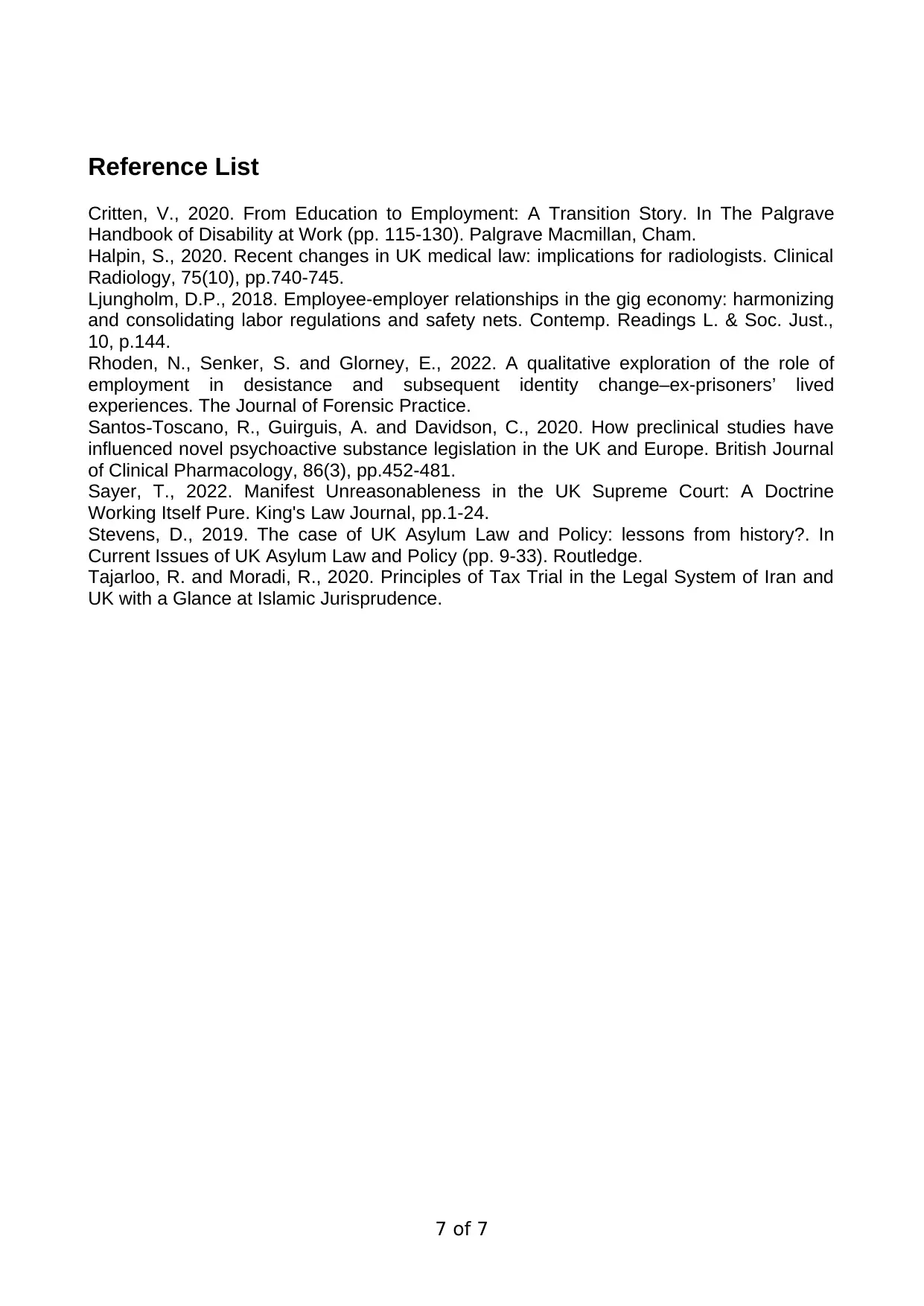
Reference List
Critten, V., 2020. From Education to Employment: A Transition Story. In The Palgrave
Handbook of Disability at Work (pp. 115-130). Palgrave Macmillan, Cham.
Halpin, S., 2020. Recent changes in UK medical law: implications for radiologists. Clinical
Radiology, 75(10), pp.740-745.
Ljungholm, D.P., 2018. Employee-employer relationships in the gig economy: harmonizing
and consolidating labor regulations and safety nets. Contemp. Readings L. & Soc. Just.,
10, p.144.
Rhoden, N., Senker, S. and Glorney, E., 2022. A qualitative exploration of the role of
employment in desistance and subsequent identity change–ex-prisoners’ lived
experiences. The Journal of Forensic Practice.
Santos‐Toscano, R., Guirguis, A. and Davidson, C., 2020. How preclinical studies have
influenced novel psychoactive substance legislation in the UK and Europe. British Journal
of Clinical Pharmacology, 86(3), pp.452-481.
Sayer, T., 2022. Manifest Unreasonableness in the UK Supreme Court: A Doctrine
Working Itself Pure. King's Law Journal, pp.1-24.
Stevens, D., 2019. The case of UK Asylum Law and Policy: lessons from history?. In
Current Issues of UK Asylum Law and Policy (pp. 9-33). Routledge.
Tajarloo, R. and Moradi, R., 2020. Principles of Tax Trial in the Legal System of Iran and
UK with a Glance at Islamic Jurisprudence.
7 of 7
Critten, V., 2020. From Education to Employment: A Transition Story. In The Palgrave
Handbook of Disability at Work (pp. 115-130). Palgrave Macmillan, Cham.
Halpin, S., 2020. Recent changes in UK medical law: implications for radiologists. Clinical
Radiology, 75(10), pp.740-745.
Ljungholm, D.P., 2018. Employee-employer relationships in the gig economy: harmonizing
and consolidating labor regulations and safety nets. Contemp. Readings L. & Soc. Just.,
10, p.144.
Rhoden, N., Senker, S. and Glorney, E., 2022. A qualitative exploration of the role of
employment in desistance and subsequent identity change–ex-prisoners’ lived
experiences. The Journal of Forensic Practice.
Santos‐Toscano, R., Guirguis, A. and Davidson, C., 2020. How preclinical studies have
influenced novel psychoactive substance legislation in the UK and Europe. British Journal
of Clinical Pharmacology, 86(3), pp.452-481.
Sayer, T., 2022. Manifest Unreasonableness in the UK Supreme Court: A Doctrine
Working Itself Pure. King's Law Journal, pp.1-24.
Stevens, D., 2019. The case of UK Asylum Law and Policy: lessons from history?. In
Current Issues of UK Asylum Law and Policy (pp. 9-33). Routledge.
Tajarloo, R. and Moradi, R., 2020. Principles of Tax Trial in the Legal System of Iran and
UK with a Glance at Islamic Jurisprudence.
7 of 7
1 out of 7
Related Documents
Your All-in-One AI-Powered Toolkit for Academic Success.
+13062052269
info@desklib.com
Available 24*7 on WhatsApp / Email
![[object Object]](/_next/static/media/star-bottom.7253800d.svg)
Unlock your academic potential
Copyright © 2020–2026 A2Z Services. All Rights Reserved. Developed and managed by ZUCOL.

